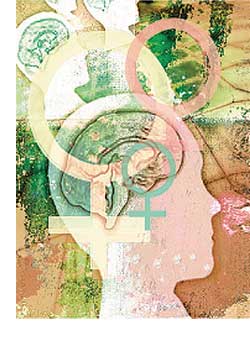By Kelly Brooks-Staub
There’s new evidence that estrogen therapy could potentially reduce the severity of stroke. In studies involving rats, School of Nursing associate professor Marguerite Littleton-Kearney, DNSc, RN, FAAN, found that animals that received oral doses of estrogen for one month before suffering a “stroke” (having blood flow to their brains restricted) recovered more quickly than rats that did not get estrogen.
Littleton-Kearney has long been interested in how female hormones like estrogen affect blood flow in the brains of women. “In general,” she notes, “women are less likely than men to have a stroke during their reproductive years, but after age 65, men and women suffer stroke at about the same rate. Unfortunately, our understanding of the role of estrogen in females during and immediately after stroke is quite limited.
She continues, “In our study of animals, we had always administered estrogen under the skin or intravenously, but most women take female hormones orally. So my research team initiated the first study of the effects of estrogen and progesterone on the size of stroke where the animals took the drug orally.”
She and her colleagues administered the hormones in quantities that simulate what a postmenopausal woman would typically ingest, feeding the rats their hormones in jelly each day for a month. After restricting blood flow to the brain for two hours, then allowing the blood to freely circulate for 24 hours, she examined the animals to measure the size of the stroke. Estrogen alone decreased the size of the stroke in the brain stem, while stroke was diminished in the cortex through use of both estrogen alone as well as a combination of estrogen and progesterone. Progesterone itself did not have any effect.
“In terms of normal blood flow to the brain, it is important that blood vessels be able to expand and contract—they must be responsive to the body’s natural vasodilators and vasoconstrictors,” says Littleton-Kearney. “Our initial studies examined only dilation of the blood vessels, so we recently conducted a study to find out whether the blood vessels’ ability to contract is affected by stroke as well.”
Littleton-Kearney found that after stroke, the vessels have difficulty contracting. Since previous studies had found difficulty with the dilation response, this finding was surprising.
“We know now that blood vessels are less responsive to both vasodilators and vasoconstrictors after stroke,” says Littleton-Kearney. “Estrogen appears to help blood vessels to be more responsive to both, helping them to expand and contract as necessary to regulate blood flow to the brain.”
Her findings were published in the April 2005 Journal of Cerebral Blood Flow and Metabolism. In the future, Littleton-Kearney hopes to better understand why estrogen has this effect, learn more about the effects of progesterone, and examine the differences between natural and synthetic hormones.
